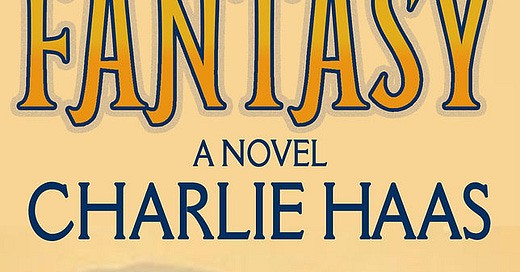It’s almost the end of the month, which means it’s time for my monthly roundup of interesting things to read, watch, and listen to. If you’re new around here, you can find past linkstacks starting here. Stumbled upon a book, newsletter, or podcast you’d like me to check out? Leave a comment down below.
Newsletter recommendation of the month
is where veteran copy editor Barbara Wallraff — author of Word Court and columnist for the Boston Globe — addresses readers’ questions and peeves about language. Start here, with a calm and reasoned response to a screed about verbing nouns. (Thanks for the tip, !) Horror movie
I saw The Apprentice in my local theater a couple of weeks ago and I cannot stop thinking about it. (If you’re unfamiliar, it’s not about the long-running TV “reality” show but rather about the show’s host and how he devolved under the malign influence of lawyer/fixer Roy Cohn.) The film’s Iranian-Danish director, Ali Abbasi, says he sees The Apprentice as “a tragedy that cautions against the dark side of power” (CBC). Screenwriter Gabriel Sherman talked to public radio’s On the Media (audio) about the film’s long gestation and myriad challenges: finding financing (an eleventh-hour Kickstarter campaign did the trick), securing a distributor, fending off legal threats from the Trump team. So far The Apprentice has flopped in the U.S. but is doing quite well overseas (Guardian).
They like “Mike”
Pizza, “hard” lemonade, mayonnaise, mustard: Why are there so many “Mike” brand names? Laura Wattenberg investigated for the Namerology blog and pinpointed the name’s appeal: It speaks not to men in general but to “fun guys.”
I like Charlie
Speaking of fun guys with fun nicknames, my longtime pal and onetime magazine colleague Charlie Haas, perhaps best known as the screenwriter of Gremlins 2, Over the Edge, and Matinee, has published his second novel, The Current Fantasy. It’s fiction based on hard-to-believe history: Just before World War I a group of artists and anarchists left Germany and created a bohemian settlement in Southern California’s San Bernardino County. I can’t wait to dig in. (Here’s my review of Charlie’s first novel, The Enthusiast.)
Food for thought
Speaking of people I used to work with and who went on to much greater glory than I did, food writer/editor
— who publishes the newsletter here on Substack — spent the Covid years creating Food and Country, a documentary about the people in the U.S. who provide our food. I saw it at the 2023 San Francisco Jewish Film Festival1 and kept waiting for it to become more widely available. And it finally is! As of this week you can rent or buy it on Amazon Prime.The resurrection of George
George magazine, founded by John F. Kennedy Jr. in 1995, covered politics and celebrities. After its trademark lapsed, “a QAnon-leaning conspiracy theorist and passionate Trump fan” revived the title as an online-only publication. He’s now its editor-in-chief. “Much of the content is innocuous,” writes the New York Times’s Richard Fausset, but not all: “One recent article suggested that the Covid-19 virus could have been ‘a ploy to undo Trump’s successes’.” If there’s a moral to this depressing story, it might be “Protect your trademarks.” (Gift link; ht
)A new word game
Alphaguess challenges you to guess the word of the day. Each guess reveals where the word sits alphabetically. Sounds simple, but isn’t. My best performance to date is seven guesses. (Via Kottke)
How to create great global names
Start with a free naming webinar presented by
and her global naming counterparts, November 7 at 8:30 a.m. Eastern, 2:30 p.m. Central European. That’s a little too early for us West Coasters, but good news: If you register (free!) you can listen to a recording of the webinar when you’re wide awake.Who was that mascot man?
Thank you, Ali Sell of the Zinzin naming agency, for compiling this nutty list of brand and sports-team mascots. Salesforce, the cloud-based software company that owns the tallest building in San Francisco, created an entire universe of mascot characters, from Astro Nomical (“pronouns: they/them”) to Max the Mule, “your integration superhero.” Then there’s Chewbie, a new mascot from Japanese candy brand HI-CHEW, which “has its own unique, whimsical language, Chewlish.” I’m still searching for examples of Chewlish vocabulary.
Canceling Kroeber
“A century ago, Alfred Kroeber opposed racism and eugenics, advocated for Indigenous rights, and almost single-handedly invented cultural anthropology in the West. Yet four years ago, UC Berkeley removed his name from one of its buildings.” - Robert Roper for Alta Magazine on how anthropologist Alfred Kroeber (1876–1960) fell from grace.
A bug called Kamala
“While jogging around Lake Merritt in downtown Oakland, the country’s oldest wildlife refuge, I’d pass by the Alameda County courthouse where Kamala Harris once interned for the district attorney. I’d think about her efforts to highlight environmental issues in her Senate tenure, including her co-introduction of the Climate Equity Act in August of 2020 (which stalled out in Congress). I’d think of her optimism in describing a group of high schoolers in Colorado who pushed Denver public schools to adopt one of the nation’s first school district climate action plans, concluding with the simple truth ‘we have time to make a difference.’ And I decided, long before the twists of recent months, to name a species after her.” - Entomologist Brad Balukjian on naming a plant bug Pseudoloxops kamalaharrisae.
Wordy and worthy
The New York Times calls them “5 Podcasts for Word Nerds” (gift link), but even non-nerds will derive joy from The Allusionist, Lingthusiasm, The Vocal Fries, A Way with Words, or Words Unravelled. That last title is new to me — it launched in April — and I’m looking forward to catching up.
O as in ominous
OpenAI, the San Francisco–based artificial intelligence company whose co-founders include Elon Musk, announced last month at a staff meeting that it would be changing its logo: Instead of a spiral-floral image, the company would henceforth be represented by a black circle. Employees were reportedly unhappy with the announcement. James I. Bowie writes in Fast Company about the underlying meanings of the move:
Why might OpenAI want to switch to using a simple circle as a logo, ditching seven years of brand equity in its current trendsetting mark? There doesn’t seem to be a great answer. With so many other AI firms having adopted similar swirly marks, OpenAI would essentially be making a spiteful Sneetches move: Once everyone else has a star on their belly, it’s time to erase the one on yours.
So far, no new logo, circular or swirly or star-shaped, has been publicly revealed.
“
R.I.P. Philip Zimbardo
remembers Philip Zimbardo (1933–2024), creator of the notorious Stanford Prison Experiment and founder of the Stanford Shyness Clinic and the Hero Imagination Project. “Men were withdrawing from society and behaving badly in 2011, and Zimbardo was one of the only ones to see how bad men could be, much like he had 40 years earlier,” writes Stein.I can’t explain why it was chosen for the Jewish Film Festival — Ruth is Jewish, yes, but the film’s content is wholly secular.









The Robert Roper piece on Alfred Kroeber was stunning. So well written; so much to digest. I had read about Ishi before but never his post-death desecration. No wonder Kroeber went into depression after their long association.
The final paragraph calling back to Scheper-Hughes’s powerful phrase “disordered mourning” will stay with me a long time. It encapsulates the complexity of coming to terms with the genocide of Native peoples, the history of anthropology, and the modern desire to “get past it.”
Thanks for linking to this and the introduction to Alta. Bonus fact: Kroeber was Ursula Le Guin’s father.
Thank you for the link to the balanced article on Alfred Kroeber and the renaming of Kroeber Hall.. I took physical anthropology from him at Cal in the early fifties. I remember that when we occasionally saw the sign "Gone Fishing" we knew that the professor was away on a field trip.